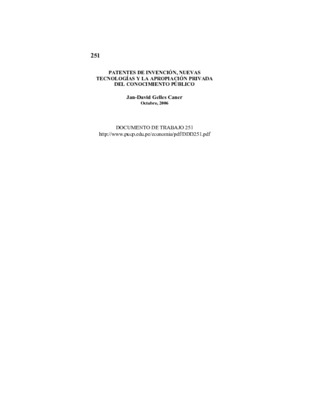| dc.contributor.author | Gelles, Jan-David | |
| dc.date.accessioned | 2015-03-19T20:37:45Z | |
| dc.date.available | 2015-03-19T20:37:45Z | |
| dc.date.issued | 2006 | |
| dc.identifier.uri | http://repositorio.pucp.edu.pe/index/handle/123456789/46891 | |
| dc.description.abstract | En este documento de trabajo se plantea un examen de equilibrio lógico del argumento deductivo utilizado de manera corriente en diversos textos económicos para alentar un sistema de patentes de invención. Asimismo se propone que dicho examen de equilibrio se debe aplicar en épocas de cambio radical en la realidad tecnológica mundial para evitar extensiones apriorísticas de la protección legal e institucional que confiere un sistema de patentes de invención basado en realidades tecnológicas pasadas. El resultado del examen planteado arroja desequilibrio parcial cuando se toman en cuenta los gastos de financiamiento y la coordinación gubernamental así como la distribución gratuita de los conocimientos útiles obtenidos en los campos de la biotecnología e Internet. Para referirse a esa apropiación indebida de conocimientos de dominio público por parte del sector privado se acuña la palabra ‘epistemo-piratería’, por analogía a ‘bio-piratería’ de uso común. Los campos tecnológicos antes mencionados fueron escogidos porque son preponderantes para explicar el incremento en el número de patentes de invención registrados a nivel global. | es_ES |
| dc.description.abstract | In this working paper an examination is made of the logical balance of the deductive argument that commonly appears in various economic texts to justify a system of patents of invention. The examination mentioned should be applied in times of radical technological change in the world to avoid a priori extensions of the legal and institutional protection provided by a system of patents of invention based on past technological realities. The result of the examination shows partial lack of balance when proper account is taken of the financial expenses and coordination efforts by governments as well as of the free distribution of useful knowledge in the fields of biotechnology and the Internet. To refer to that non-legitimate appropriation of public knowledge by the private sector the term ‘epistemo-piracy’ is coined by analogy with ‘bio-piracy’ of common use. The fields of biotechnology and the Internet were chosen because they are preponderant to explain the rise in the number of patents of invention in the world. | en_US |
| dc.language.iso | spa | es_ES |
| dc.publisher | Pontificia Universidad Católica del Perú. Departamento de Economía | es_ES |
| dc.relation.ispartofseries | Documento de Trabajo;251 | es_ES |
| dc.rights | Atribución-NoComercial-SinDerivadas 2.5 Perú | * |
| dc.rights | info:eu-repo/semantics/openAccess | es_ES |
| dc.rights.uri | http://creativecommons.org/licenses/by-nc-nd/2.5/pe/ | es_ES |
| dc.subject | Patentes--Aspectos económicos | es_ES |
| dc.title | Patentes de invención, nuevas tecnologías y la apropiación privada del conocimiento público | es_ES |
| dc.title.alternative | Invention patents, new technologies and private appropriation of public knowledge. | en_US |
| dc.type | info:eu-repo/semantics/workingPaper | |
| dc.type.other | Documento de trabajo | |
| dc.subject.ocde | http://purl.org/pe-repo/ocde/ford#5.02.00 | |
| dc.publisher.country | PE | |


